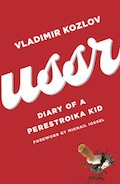I spent the riots in a penthouse at the Chateau Marmont with this ex-philosophy major from Stanford whose family owned all the more oily pieces of land in Arizona, Mexico and California and who had taken up the profession of herding cattle. He was a Stanford Cowboy, is how I always thought of him in my mind. He showed me his spurs so I’d believe him and his saddle bags. In his saddle bags he kept his prize possessions, books on magic and the works of Alistair Crowley. His horse must have felt like a roving library. The police shot this guy in a car while he was taking his wife to the hospital to have a baby just as Nicky, the Stanford Cowboy, must have been checking into the Chateau that evening, having driven from Indio, the desert where the Santa Ana winds came from.
The guy getting shot in Watts made the winds, I think, like escaping gas, explode.
L.A. was closed.
There were no cars out on the streets. Everyone was home watching tv, where Joe Pine had dumped a satchelful of guns out onto his podium and explained that he was not about to let anyone try and get his stuff away from him, never mind his wife and daughters.




